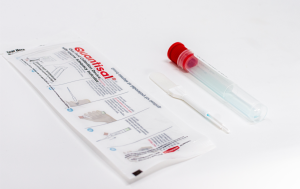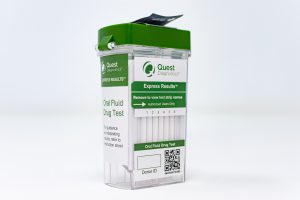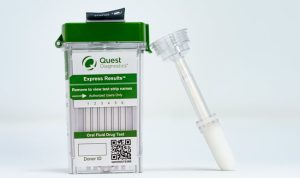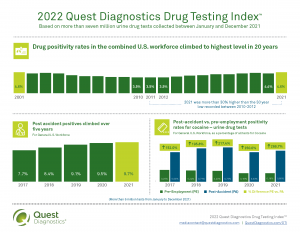The Quest Diagnostics Drug Testing Index™ (DTI) is an essential report, considered a valuable tool for workforce drug testing industry trends since its inception in 1988. It examines positivity rates, providing a comprehensive analysis of workplace drug use trends among federally mandated, safety-sensitive workers, the general US workforce, and the combined US workforce. When it comes to understanding historical patterns of drug use among American workers, the DTI is the industry standard.
Download the 2024 DTI report and discover valuable insights.
Employers benefit from having more tools, like the Quest Diagnostics Drug Testing Index™ from one provider
Employers must manage an often-overwhelming number of benefits and vendor partnerships, so a streamlined solution can save leaders time and contribute to operational efficiency. With Quest Diagnostics Workforce Health Solutions, employers now have one primary contact for population health management, clinical testing, and drug testing, reducing administrative burdens and optimizing resource allocation. This unified offering may not only save time and costs but also allow employers to have a diverse portfolio of wellness solutions for their employee populations.
Analysis from 2023 revealed key insights into drug test cheating
This year’s DTI reveals the rates of substituted specimens increased more than 600% in the general US workforce according to analysis of over 5.5 million deidentified drug tests in 2023. People choose to dilute, substitute, or otherwise cheat on their drug screens for many reasons, the primary one is likely to not allow laboratories to detect drugs currently present in their system.
Leverage the actionable insights from this year’s Drug Testing Index™
Although there are safeguards to help employers prevent a job applicant or an employee who uses drugs from cheating or altering a donor specimen, this latest analysis from the DTI shows that attempts to subvert detection are on the rise as well.
Read exclusive coverage by the Wall Street Journal about this year’s key DTI insights.
By the numbers: Marijuana continues upward positivity trend
The 2024 DTI shows that marijuana positivity in the general US workforce increased 4.7% (4.3% in 2022 versus 4.5% in 2023). Over 5 years, marijuana positivity has increased significantly.
As more states continue to change their legislation of recreational marijuana, use of this popular controlled substance by American employees continues its upward trend. When analyzing marijuana positivity in legal states versus those where the drug is illegal, the legal states’ positivity numbers continue to outpace those where the drug remains illegal. That may seem like an obvious trend, but it should not be overlooked. Simply put, more employees are using the drug.
To clarify, we’re not talking about just the general public; the data in the DTI represents employment-specific drug testing in all industries. Given that workforce health and workplace safety are of concern, even in typical office environments, employers should weigh their options on how to address marijuana use in their workforce.
According to this year’s DTI, Marijuana positivity, in the general US workforce, increased 1.8% (5.7% in 2022 versus 5.8%) in states in which recreational marijuana is legal and 2.6% (3.9% in 2022 versus 4.0% in 2023) in states in which medical marijuana is legal. In states in which neither recreational nor medical marijuana is legal, positivity in the general US workforce increased 6.5% year over year (3.1% in 2022 versus 3.3% in 2023) and increased 22% over 5 years (2.7% in 2019 versus 3.3% in 2023).
Learn how employers may use the DTI to make important drug-free workplace decisions.
The versatility of drug testing with oral fluid collections
When it comes to screening prospective and current employees for marijuana use, employers may be confused on what they’re able to do based on the legal status of the drug in their state. For example, in both Washington and California legislation has been approved that prohibits employers, in some instances, from taking adverse action against an employee or applicant based on a marijuana drug test result for a “nonpsychoactive metabolite(s).” Although employers may interpret that as a ban on employment drug testing for marijuana, that is not an accurate conclusion.
The reality is that employers still have options available to help enforce their drug-free workplace policies. For instance, Quest Diagnostics lab-based oral fluid testing and oral fluid point of care testing devices screen for the presence of the psychoactive parent drug (i.e., THC), rather than a metabolite of THC.
Employers may also consider shifting their screening practices from a pre-employment program to an, “always-on” random testing program. In this practice, a pool of employees is selected at random to undergo drug screening. Coupled with versatility of oral fluid drug testing for specific employees where impairment is suspected, employers can have a strong offering to help deter drug use in their workforce.
Doubling down on oral fluid testing may even lead employers to discover the convenience of instant oral fluid drug tests. These types of collections may be done nearly anywhere and can produce a negative result almost instantly. Depending on the device used, presumptive positive results may be sent into the laboratory for further testing to confirm the presence of illicit substances in the sample.
A resource setting the standard for a data-driven industry
At Quest Diagnostics, we realize the importance good data play in helping employers make decisions based on actionable trends and information. The DTI has been released annually for 36 years to help reveal insights into patterns of drug use in the American workforce. We publish these findings as a public service for government, employers, policy makers, and the general public.
These numbers are only the beginning of this year’s in-depth report. If you would like to take a deeper dive into the data, review historical data from past years’ numbers, or look at specific findings in different industries, you may do so by accessing our DTI hub.
To learn more about how you can create a strong drug-free workplace program, connect with us today.
 Your Privacy Choices
|
Privacy Notices
|
Terms
|
Language Assistance / Non-Discrimination Notice | Asistencia de Idiomas / Aviso de no Discriminación | 語言協助 / 不䈚視通知
Your Privacy Choices
|
Privacy Notices
|
Terms
|
Language Assistance / Non-Discrimination Notice | Asistencia de Idiomas / Aviso de no Discriminación | 語言協助 / 不䈚視通知



















The Quest Diagnostics Drug Testing Index™ (DTI) is an essential report, considered a valuable tool for workforce drug testing industry trends since its inception in 1988. It examines positivity rates, providing a comprehensive analysis of workplace drug use trends among federally mandated, safety-sensitive workers, the general US workforce, and the combined US workforce. When it comes to understanding historical patterns of drug use among American workers, the DTI is the industry standard.
Download the 2024 DTI report and discover valuable insights.
Employers benefit from having more tools, like the Quest Diagnostics Drug Testing Index™ from one provider
Employers must manage an often-overwhelming number of benefits and vendor partnerships, so a streamlined solution can save leaders time and contribute to operational efficiency. With Quest Diagnostics Workforce Health Solutions, employers now have one primary contact for population health management, clinical testing, and drug testing, reducing administrative burdens and optimizing resource allocation. This unified offering may not only save time and costs but also allow employers to have a diverse portfolio of wellness solutions for their employee populations.
Analysis from 2023 revealed key insights into drug test cheating
This year’s DTI reveals the rates of substituted specimens increased more than 600% in the general US workforce according to analysis of over 5.5 million deidentified drug tests in 2023. People choose to dilute, substitute, or otherwise cheat on their drug screens for many reasons, the primary one is likely to not allow laboratories to detect drugs currently present in their system.
Leverage the actionable insights from this year’s Drug Testing Index™
Although there are safeguards to help employers prevent a job applicant or an employee who uses drugs from cheating or altering a donor specimen, this latest analysis from the DTI shows that attempts to subvert detection are on the rise as well.
Read exclusive coverage by the Wall Street Journal about this year’s key DTI insights.
By the numbers: Marijuana continues upward positivity trend
The 2024 DTI shows that marijuana positivity in the general US workforce increased 4.7% (4.3% in 2022 versus 4.5% in 2023). Over 5 years, marijuana positivity has increased significantly.
As more states continue to change their legislation of recreational marijuana, use of this popular controlled substance by American employees continues its upward trend. When analyzing marijuana positivity in legal states versus those where the drug is illegal, the legal states’ positivity numbers continue to outpace those where the drug remains illegal. That may seem like an obvious trend, but it should not be overlooked. Simply put, more employees are using the drug.
To clarify, we’re not talking about just the general public; the data in the DTI represents employment-specific drug testing in all industries. Given that workforce health and workplace safety are of concern, even in typical office environments, employers should weigh their options on how to address marijuana use in their workforce.
According to this year’s DTI, Marijuana positivity, in the general US workforce, increased 1.8% (5.7% in 2022 versus 5.8%) in states in which recreational marijuana is legal and 2.6% (3.9% in 2022 versus 4.0% in 2023) in states in which medical marijuana is legal. In states in which neither recreational nor medical marijuana is legal, positivity in the general US workforce increased 6.5% year over year (3.1% in 2022 versus 3.3% in 2023) and increased 22% over 5 years (2.7% in 2019 versus 3.3% in 2023).
Learn how employers may use the DTI to make important drug-free workplace decisions.
The versatility of drug testing with oral fluid collections
When it comes to screening prospective and current employees for marijuana use, employers may be confused on what they’re able to do based on the legal status of the drug in their state. For example, in both Washington and California legislation has been approved that prohibits employers, in some instances, from taking adverse action against an employee or applicant based on a marijuana drug test result for a “nonpsychoactive metabolite(s).” Although employers may interpret that as a ban on employment drug testing for marijuana, that is not an accurate conclusion.
The reality is that employers still have options available to help enforce their drug-free workplace policies. For instance, Quest Diagnostics lab-based oral fluid testing and oral fluid point of care testing devices screen for the presence of the psychoactive parent drug (i.e., THC), rather than a metabolite of THC.
Employers may also consider shifting their screening practices from a pre-employment program to an, “always-on” random testing program. In this practice, a pool of employees is selected at random to undergo drug screening. Coupled with versatility of oral fluid drug testing for specific employees where impairment is suspected, employers can have a strong offering to help deter drug use in their workforce.
Doubling down on oral fluid testing may even lead employers to discover the convenience of instant oral fluid drug tests. These types of collections may be done nearly anywhere and can produce a negative result almost instantly. Depending on the device used, presumptive positive results may be sent into the laboratory for further testing to confirm the presence of illicit substances in the sample.
A resource setting the standard for a data-driven industry
At Quest Diagnostics, we realize the importance good data play in helping employers make decisions based on actionable trends and information. The DTI has been released annually for 36 years to help reveal insights into patterns of drug use in the American workforce. We publish these findings as a public service for government, employers, policy makers, and the general public.
These numbers are only the beginning of this year’s in-depth report. If you would like to take a deeper dive into the data, review historical data from past years’ numbers, or look at specific findings in different industries, you may do so by accessing our DTI hub.
To learn more about how you can create a strong drug-free workplace program, connect with us today.